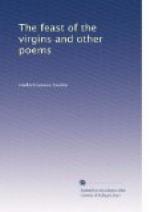And here she grew up like a queen—
a romping and lily-lipped laughter,
And danced on the undulant green,
and played in the frolicsome waters,
Where the foaming tide tumbles and whirls
o’er the murmuring rocks in the rapids;
And whiter than foam were the pearls
that gleamed in the midst of her laughter.
Long and dark was her flowing hair flung
like the robe of the night to the breezes;
And gay as the robin she sung,
or the gold-breasted lark of the meadows.
Like the wings of the wind were her feet,
and as sure as the feet of Ta-to-ka[J]
And oft like an antelope fleet
o’er the hills and the prairies she bounded,
Lightly laughing in sport as she ran,
and looking back over her shoulder
At the fleet-footed maiden or man
that vainly her flying feet followed.
The belle of the village was she,
and the pride of the aged Ta-te-psin,
Like a sunbeam she lighted his tee,
and gladdened the heart of her father.
[I] Tate—wind,—psin—wild-rice—wild-rice wind.
[J] mountain antelope.
In the golden-hued Wazu-pe-wee—
the
moon when the wild-rice is gathered;
When the leaves on the tall sugar-tree
are
as red as the breast of the robin,
And the red-oaks that border the lea
are
aflame with the fire of the sunset,
From the wide, waving fields of wild-rice—
from
the meadows of Psin-ta-wak-pa-dan,[K]
Where the geese and the mallards rejoice,
and
grow fat on the bountiful harvest,
Came the hunters with saddles of moose
and
the flesh of the bear and the bison,
And the women in birch-bark canoes
well
laden with rice from the meadows.
[K] Little Rice River. It bears the name of Rice Creek to-day and empties into the Mississippi from the east, a few miles above Minneapolis.
With the tall, dusky hunters, behold,
came
a marvelous man or a spirit,
White-faced and so wrinkled and old,
and
clad in the robe of the raven.
Unsteady his steps were and slow,
and
he walked with a staff in his right hand,
And white as the first-falling snow
were
the thin locks that lay on his shoulders.
Like rime-covered moss hung his beard,
flowing
down from his face to his girdle;
And wan was his aspect and weird,
and
often he chanted and mumbled
In a strange and mysterious tongue,
as
he bent o’er his book in devotion,
Or lifted his dim eyes and sung,
in
a low voice, the solemn “Te Deum,”
Or Latin, or Hebrew, or Greek—
all
the same were his words to the warriors,—
All the same to the maids and the meek,
wide-wondering-eyed,
hazel-brown children.




